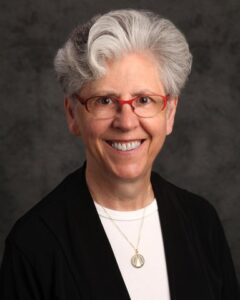 Sister Corinne Florek, executive director of the Religious Communities Investment Fund and former director of the Mercy Partnership Fund, has been involved in community investments for over 30 years. Religious Communities Invest Fund has invested $300,000 with IFF since 2013 to support facility needs for nonprofits across the Midwest.
Sister Corinne Florek, executive director of the Religious Communities Investment Fund and former director of the Mercy Partnership Fund, has been involved in community investments for over 30 years. Religious Communities Invest Fund has invested $300,000 with IFF since 2013 to support facility needs for nonprofits across the Midwest.
How did you become involved in community development?
I have been in this field since 1980. My congregation asked me to get an MBA because they were looking for sisters with the skills to work in our finance office. My first job was with a federation of craft cooperatives in Appalachia. I then worked for the Institute of Community Economics, which created the loan fund model. Many loan funds started with money from religious organizations and my own congregation, the Adrian Dominicans, have often been the first investors.
I also worked for the Catholic Campaign for Human Development in Washington, D.C., and Women’s Initiative, a microfinance fund in San Francisco. I recently managed the community investment funds for the Sisters of Mercy, known as Mercy Partnership Fund. Now I manage community investment funds for 23 congregations in a pooled fund called the Religious Communities Investment Fund.
What drives the Religious Communities Investment Fund?
We invest in community development because of our commitment to social justice and to empowering people. As I look for funding opportunities, I’m seeking those with innovative approaches to sustain and empower people who live in the low-income community, especially organizations that are focusing on the systemic issues of poverty. The sisters also are involved with socially responsible investing, promoting environmental issues, worker rights issues, human issues, credit issues, etc. We want corporations to be better corporate citizens.
We use our resources to help organizations and people implement solutions. I believe that we should never decide for people what they can and should decide for themselves. I am constantly asking how we can help communities become resilient, own assets, and be self-determining, because it is important to build communities as well as support individuals.
Does your organization have a special focus?
Because our money is coming from religious women, we particularly want to help women and find ways to empower them, which includes investing in child care, housing, jobs, and safe communities. Focusing on women often involves education and health care as well as financing. When you ask women what their dreams are, it’s often about the future for their children. A school, a water source, sanitation — they’re looking at larger community issues. Empowering women empowers the whole community.
Since I want to empower — not just help — women, I ask borrowers how many women they have on their board or in management. If 75 percent of the people you are helping are women, but you don’t have any on your board or in management, you are not empowering women. And if we don’t advocate for women, who will?
How did you first learn about IFF?
I had heard about IFF through my work with Partners for the Common Good. I also know IFF founder Trinita Logue, having been involved with the Opportunity Finance Network. When I was looking for opportunities in the Midwest, I contacted IFF about a possible investment. I appreciate that they work with nonprofits that serve and stabilize the community.
You are a past recipient of the Ned Gramlich Lifetime Achievement Award from Opportunity Finance Network.
When I received the OFN award in 2010, I brought up on stage almost 30 sisters who had been involved in this kind of work almost as long as myself, if not longer. It was a powerful moment for audience members at loan funds that were started by banks and government money to realize it actually started with faith-based organizations and individuals. And it was inspiring for the sisters to see how those first loans have grown into so many organizations.
What do you like to do outside of work?
I love singing and dancing. I used to be in a liturgical dance group that performed during Mass. I now sing in an a cappella group. I also read to HeadStart kids once a week as part of a library program. It’s the highlight of my week and their hugs get me through all the balance sheets and income statements I analyze every day.